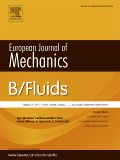
EUROPEAN JOURNAL OF MECHANICS B-FLUIDS
Scope & Guideline
Advancing Knowledge in Fluid Mechanics
Introduction
Aims and Scopes
- Fluid Dynamics and Instabilities:
Research on the behavior of fluids under various conditions, including stability analyses, turbulence, and the dynamics of fluid flow in complex geometries. - Numerical Methods and Computational Fluid Dynamics (CFD):
Development and application of numerical techniques, such as Lattice Boltzmann methods, Finite Element Methods, and Computational Fluid Dynamics simulations to model fluid behavior. - Multiphase and Non-Newtonian Flows:
Studies involving complex fluid interactions, including multiphase systems, non-Newtonian fluids, and the effects of rheological properties on flow characteristics. - Thermal and Mass Transfer:
Investigations into heat and mass transfer phenomena in fluid systems, including convective heat transfer, thermal stability, and the impact of temperature gradients on fluid behavior. - Fluid-Structure Interaction:
Research focusing on the interactions between fluid flows and solid structures, particularly in applications such as biomedical engineering and aerospace. - Environmental Fluid Mechanics:
Studies addressing fluid dynamics in natural environments, such as rivers, oceans, and atmosphere, focusing on phenomena like waves, currents, and sediment transport.
Trending and Emerging
- Machine Learning and AI in Fluid Mechanics:
There is a growing trend towards the application of machine learning techniques and artificial intelligence in fluid dynamics, particularly in predictive modeling and data-driven approaches. - Complex Fluid Dynamics in Biological Systems:
Research focusing on the fluid dynamics of biological systems, including blood flow, droplet dynamics in microfluidics, and interactions in biological tissues, is increasingly prominent. - Multiscale and Multifunctional Fluid Systems:
Emerging studies are investigating multiscale fluid systems that integrate various physical phenomena, such as electrohydrodynamics and magnetohydrodynamics, to understand complex interactions. - Environmental and Sustainable Fluid Mechanics:
There is an increasing focus on the environmental implications of fluid mechanics, including studies on sediment transport, pollution dispersion, and renewable energy applications in fluid systems. - Advanced Computational Techniques:
The journal shows a notable trend towards advanced computational methods, including hybrid approaches that combine various numerical techniques for more accurate fluid simulations.
Declining or Waning
- Classical Fluid Dynamics:
There is a diminishing emphasis on purely theoretical studies within classical fluid dynamics, possibly due to the increased focus on computational methods and experimental validations. - Simple Newtonian Fluid Studies:
Research centered on basic Newtonian fluid behaviors appears to be waning, as the field evolves towards more complex fluid interactions and non-Newtonian analyses. - Hydrodynamic Stability in Ideal Conditions:
Research focusing on hydrodynamic stability in idealized, simplified conditions has decreased, as more complex real-world applications and phenomena gain prominence.
Similar Journals
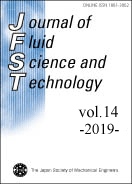
Journal of Fluid Science and Technology
Transforming Mechanical Engineering Through Fluid InsightsThe Journal of Fluid Science and Technology, published by the Japan Society of Mechanical Engineers, serves as a pivotal platform for the dissemination of cutting-edge research in the fields of fluid mechanics and mechanical engineering. With an ISSN of 1880-5558, this Open Access journal has been dedicated to advancing the understanding of fluid flow and transfer processes since its establishment. As of 2023, it holds a significant position with a Q3 quartile ranking in both Fluid Flow and Transfer Processes and Mechanical Engineering categories. Researchers and practitioners are encouraged to explore the journal’s extensive collection of articles, contributing to the body of knowledge that impacts various practical applications in engineering and technology. The journal, which has established a reputation for quality amidst a competitive landscape, further fosters international collaboration and education by providing unrestricted access to its content. For professionals and students alike, the Journal of Fluid Science and Technology represents an invaluable resource for the latest findings and innovations in fluid dynamics and mechanical systems.
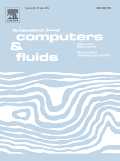
COMPUTERS & FLUIDS
Exploring Innovative Solutions in Computer Science and EngineeringCOMPUTERS & FLUIDS, published by PERGAMON-ELSEVIER SCIENCE LTD, is a premier journal in the fields of Computer Science and Engineering, with a distinguished history dating back to 1973. Its Q1 ranking in both Computer Science (Miscellaneous) and Engineering (Miscellaneous) illustrates its high impact and relevance, being positioned among the top tier of scientific publications. With a robust focus on the intersection of computational methods and fluid dynamics, this journal serves as a vital platform for researchers, professionals, and students dedicated to advancing knowledge and technology within these domains. Although it is not an open-access journal, its articles are accessible through various academic institutions and libraries, ensuring that vital research reaches its intended audience. Readers can explore innovative methodologies and applications, reinforcing the journal's commitment to enhancing the understanding of fluid mechanics through cutting-edge computational approaches. For more details, visit the official website of COMPUTERS & FLUIDS to stay abreast of the latest research advancements.

EXPERIMENTS IN FLUIDS
Transforming experimental methodologies into groundbreaking applications.EXPERIMENTS IN FLUIDS is a prestigious journal in the field of fluid mechanics, published by SPRINGER, renowned for its rigorous peer-reviewed research and experimental studies that advance the understanding of fluid behavior in various contexts. With an ISSN number of 0723-4864 and an E-ISSN of 1432-1114, this journal has published influential works since its inception in 1983, maintaining a convergence of data and insights crucial for both academia and industry. Its impressive impact factor and ranking in the Q1 category for Computational Mechanics, Fluid Flow and Transfer Processes, Mechanics of Materials, and Physics and Astronomy underscore its significance in fostering high-quality research in these domains. Researchers and professionals benefit from the comprehensive access to experimental methodologies, innovative applications, and cutting-edge results that the journal provides without the Open Access model. The journal's offices located in New York, USA, facilitate its global outreach, making it an essential resource for scholars and practitioners seeking to deepen their expertise in fluid dynamics and related fields.

Physical Review Fluids
Unraveling Complexities in Fluid FlowPhysical Review Fluids is an esteemed journal published by the American Physical Society, focusing on the intricate and essential field of fluid dynamics. With an impressive Q1 ranking in categories such as Computational Mechanics, Fluid Flow and Transfer Processes, and Modeling and Simulation, this journal serves as a pivotal resource for researchers and professionals seeking to disseminate high-quality and innovative research findings. The journal's scope encompasses a broad spectrum of topics within fluid mechanics, promoting advancements in theoretical, computational, and experimental methodologies. Although it is not an open-access journal, its publications are critically well-received, underpinned by its strong standing in the Scopus rankings which place it in the top percentiles across various relevant fields. Physical Review Fluids has been a foundational platform for scholars to share their discoveries from 2016 through 2024, making it an indispensable asset in the ongoing evolution of fluid dynamics research.
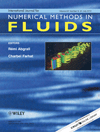
INTERNATIONAL JOURNAL FOR NUMERICAL METHODS IN FLUIDS
Charting New Territories in Computational Fluid MechanicsINTERNATIONAL JOURNAL FOR NUMERICAL METHODS IN FLUIDS, published by Wiley, has established itself as a leading platform for cutting-edge research in the fields of applied mathematics, computational mechanics, computer science applications, and mechanical engineering. With its ISSN 0271-2091 and E-ISSN 1097-0363, this journal is committed to disseminating high-quality, peer-reviewed articles that contribute to the advancement of numerical methodologies in fluid dynamics. Boasting a commendable 2023 impact factor that places it in the second quartile across multiple relevant categories, it provides insights into significant research dimensions that engage an audience of researchers, professionals, and students keen on the computational challenges of fluid flow. The journal's broad scope encompasses foundational and applied research, encouraging the exploration of new numerical techniques and algorithms. As an invaluable resource based in the United Kingdom, INTERNATIONAL JOURNAL FOR NUMERICAL METHODS IN FLUIDS remains dedicated to providing insights and fostering innovation in its domain, with a consistent publication history spanning from 1981 to 2024.
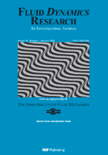
FLUID DYNAMICS RESEARCH
Fostering Collaboration in Fluid Dynamics ResearchFLUID DYNAMICS RESEARCH, published by IOP Publishing Ltd, is a pivotal journal dedicated to advancing the understanding of fluid dynamics through interdisciplinary research that spans several domains including mechanical engineering and physics. With an ISSN of 0169-5983 and E-ISSN 1873-7005, this journal provides a vital platform for researchers aiming to disseminate new findings and theoretical advancements in fluid flow and transfer processes. As of 2023, FLUID DYNAMICS RESEARCH holds a commendable position within the academic community, ranked Q3 in fluid flow and transfer processes, mechanical engineering, and miscellaneous physics and astronomy categories. The journal showcases a diverse array of articles that not only inspire collaboration among professionals and students but also ensure that theoretical and experimental studies are accessible for further development in the field. Operating from the United Kingdom, the journal offers a unique opportunity for scholars worldwide to contribute to the vibrant community dedicated to understanding the complexities of fluid dynamics, even as it anticipates converging its years of research from 1986 to 2024.

Experimental and Computational Multiphase Flow
Transforming Understanding of Complex Fluid PhenomenaExperimental and Computational Multiphase Flow, published by SpringerNature, is a prestigious academic journal that critically examines advancements in the field of fluid dynamics, with a specialized focus on multiphase flow phenomena. Since its inception in 2019, the journal has established a remarkable reputation, attaining Q1 status in Fluid Flow and Transfer Processes as well as Mechanical Engineering according to the 2023 category quartiles, reflecting its high impact and relevance in these domains. With Scopus rankings placing it among the top 15 journals in both Chemical Engineering and Nuclear Energy and Engineering, Experimental and Computational Multiphase Flow is an essential resource for researchers, professionals, and students engaged in cutting-edge studies and applications. Although it operates on a subscription model, the journal remains dedicated to disseminating high-quality research and fostering a deeper understanding of complex fluid interactions across various scientific disciplines. By prioritizing innovative methodologies and interdisciplinary collaborations, the journal aims to significantly contribute to the ongoing evolution of multiphase flow research, recognizing its critical importance in engineering and energy sectors.
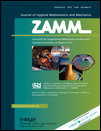
ZAMM-Zeitschrift fur Angewandte Mathematik und Mechanik
Unveiling Innovative Solutions in Applied Mathematics and Mechanics.ZAMM-Zeitschrift fur Angewandte Mathematik und Mechanik is a distinguished journal published by WILEY-V C H VERLAG GMBH, committed to advancing the fields of applied mathematics and computational mechanics since its inception in 1921. With a significant trajectory spanning nearly a century, this journal serves as a critical platform for the dissemination of high-quality, peer-reviewed research that encompasses theoretical and practical advancements in these disciplines. Currently holding a Q3 category in Applied Mathematics and Q2 in Computational Mechanics as per the 2023 rankings, ZAMM demonstrates its prominence with measurable impact in both fields, reflected in its Scopus rankings: 202 out of 635 journals in Applied Mathematics and 32 out of 89 in Computational Mechanics. Although it does not provide open access, ZAMM remains invaluable to researchers, professionals, and students seeking to deepen their understanding and contribute to the evolving landscape of mathematical applications in engineering contexts. Explore the latest insights and methodologies that push the boundaries of applied mathematics and mechanics by engaging with ZAMM’s comprehensive range of articles.

ATOMIZATION AND SPRAYS
Connecting Researchers in Fluid Mechanics and BeyondATOMIZATION AND SPRAYS, published by BEGELL HOUSE INC, stands at the forefront of research in the dynamic field of chemical engineering, particularly focusing on the intricate processes of atomization and the mechanics of droplet dynamics. Established in 1996, this prestigious journal aims to disseminate innovative findings and methodologies that drive advancements in applications ranging from spray technologies in industrial processes to environmental technology and energy conversion systems. With a current Impact Factor that reflects its significance within the community—ranked in the Q3 quartile—it serves as a comprehensive resource for researchers, professionals, and students eager to deepen their understanding of fluid mechanics and spray applications. Though not an open-access publication, it provides critical insights and a platform for scholarly communication and exchange in its converged years, fostering collaboration and innovation within the domain.

Fluid Dynamics
Advancing the frontiers of fluid flow research.Fluid Dynamics is a distinguished journal that has been at the forefront of research in the field of fluid flow and transfer processes since its inception in 1966. Published by MAIK NAUKA/INTERPERIODICA/SPRINGER, this journal serves as a valuable platform for engineers, scientists, and researchers dedicated to advancing the understanding of mechanical and fluid dynamic phenomena. With a Q3 ranking in key categories such as Fluid Flow and Transfer Processes, Mechanical Engineering, and Physics and Astronomy, Fluid Dynamics holds a significant position in the academic community, attracting submissions that push the boundaries of knowledge and application. Although it does not currently offer open access options, the journal is recognized for its robust editorial standards and impactful contributions to the field, making it essential reading for anyone involved in fluid dynamics research. Given its consistent publication through to 2024, Fluid Dynamics continues to inspire innovation and collaboration in an ever-evolving scientific landscape.